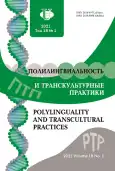“Word Code” by O.O. Suleimenov in Electronic-handwritten and Printed Versions
- Authors: Dzhusupov M.1
-
Affiliations:
- Uzbek State University of World Languages
- Issue: Vol 18, No 1 (2021)
- Pages: 103-117
- Section: BOOK REVIEW
- URL: https://journal-vniispk.ru/2618-897X/article/view/326635
- DOI: https://doi.org/10.22363/2618-897X-2021-18-1-103-117
- ID: 326635
Cite item
Full Text
Abstract
The article provides a comparative analysis of an electronic manuscript and a printed book by O.O. Suleimenov “Word code. Introduction to the Universal Etymological Dictionary ‘1001 Words’”. The similarities and differences in semantic and stylistic nominations of titles and paragraphs in the manuscript and in the printed original are considered. Structural and qualitative differences in the content of the new titles of the book, the peculiarities of the semantic advancement in them, which include a brief reflection of the content of the corresponding section of the study, are revealed and analyzed. The analysis and thesis description of new paragraphs, which were introduced by the author after working on the electronic manuscript of the book, are carried out. The main conceptual approach of O.O. Suleimenov to the search for the ancient primary source of the word (etymon) and writing both in the manuscript and in the original of the book, is to consider in unity, in close interconnection, the main five aspects of a scientific problem: figurative image (drawing, hieroglyph), concept, word, meaning, pronunciation linguistic unit in languages, adverbs, dialects, dialects in antiquity and now, their semantic and sound similarities and differences in different regions of the earth. The evolution of the wording of the titles and the semantic and stylistic advancement in them is significant, which is associated either with a slight lexical change in the wording of the title of the paragraph, or with the introduction of a different (updated) title, or with the introduction of a new paragraph into the structure of the book. These innovations of the author contributed to the improvement of the structural and logical-content significance of the book.
About the authors
Mahanbet Dzhusupov
Uzbek State University of World Languages
Author for correspondence.
Email: mah.dzhusupov@mail.ru
Doctor in Philology, Professor, Professor
21-a, G-9A block, Kichik Halka Str., Tashkent, 100138, UzbekistanReferences
- Sulejmenov, O.O.1975. Az i Ja. Alma-Ata: Zhazushy, 1975. Print. (In Russ.)
- Sulejmenov, O.O. 1998. Jazyk pis’ma. Vzgljad v doistoriju — o proishozhdenii pis’mennosti i jazyka malogo chelovechestva. Almaty — Rim. Print. (In Russ.)
- Sulejmenov, O.O. 2002. Tjurki v doistorii. Almaty. Print. (In Russ.)
- Sulejmenov, O.O. 2004. Peresekajushhiesja paralleli. Rim — Almaty. Print. (In Russ.)
- Sulejmenov, O.O. 2014. Kod slova. Vvedenie v Universal’nyj jetimologicheskij slovar’ «1001 slovo». Almaty: Izd-ij dom «Biblioteka Olzhasa». Print. (In Russ.)
- Sulejmenov, O.O., et al. 2018. «Word code». RUDN Journal of Language Education and Translingual Practices 15 (1): 128-165. Web. doi: 10.22363/2312-8011-2018-15-1-128-165
- Preobrazhenskij, S.Ju. 2018. “On Imaginary Philology by O.O. Suleimenov”. Polylinguality and Transcultural Practices 15 (3): 406—409.
- Dzhusupov, M. 2018. ““Language of Writing”, Or “Writing as a Language in a Script””. Polylinguality and Transcultural Practices 15 (3): 422-444. Web. doi: 10.22363/2618-897X-201815-3-422-444
- Dzhusupov, M. 2019. “Ethymological dictionary of the Russian language — heritage of the Russian and world linguistics (pro-Fasmer)”. Filologicheskie nauki. Scientific Essays of Higher Education 3: 68—77. Web. Doi: https://doi.org/10.20339/PhS.3-19.068
- Dzhusupov, N.M. 2016. “Active Stylistically Relevant Processes as a Result of Foregrounding of Linguistic Deviations”. Bulletin of Peoples’ Friendship University of Russia. Series Problems of Education: Languages and Speciality 1: 19—27.
- Dzhusupov, N.M. 2016. “Foregrounding Theory in Linguistics: Foundations, Trends, Interpretations”. Bulletin of Peoples’ Friendship University of Russia. Series: Theory of Language, Semiotics, Semantics 2: 41—50. Print. (In Russ.)
- Suleimenov, O.O. 2018. “Utro jetimologii”. RUDN Journal of Language Education and Translingual Practices 15 (1): 166—168. Print. (In Russ.)
- Sulejmenov, O.O. 2018. “Rodina bogov”. Polylinguality and Transcultural Practices 1 (3): 472—481. Print. (In Russ.)
- Uzbekov, T.S. 2017. “Language game: paradox and absurd”. RUDN Journal of Language Studies, Semiotics and Semantics 8 (3): 735—745. Print. (In Russ.)
- Dzhusupov, N.M. 2018. “Jazykovaja deviacija kak lingvokreativnyj process v hudozhestvennom tekste (monolingval’nyj i translingval’nyj aspekty)”. In Bi-, poli-, translingvizm i jazykovoe obrazovanie. Posvjashhaetsja nashim Uchiteljam: IV International Scientific Conference Proceedings. Moscow, Peoples’ Friendship University of Russia Proceedings. Dec. 7—8, 20018. Print. (In Russ.)
- Kancevich, L.R. 2000. “Korejskoe pis’mo”. Bol’shoj jenciklopedicheskij slovar’. Jazykoznanie. Moscow: Nauchnoe izdatel’stvo Bol’shaja Rossijskaja jenciklopedija. Print. (In Russ.)
- Ivanov, V.V. 2016. Ot bukvy i sloga k ieroglifu: sistemy pis’ma v prostranstve i vremeni. Moscow:, Izd.-kij dom JaSK: Jazyki slavjanskoj kul’tury. Print. (In Russ.)
- Fasmer, M. 2007. Jetimologicheskij slovar’ russkogo jazyka. In 4 vol. Moscow: Astrel’; Ast. Print. (In Russ.)
- Istrin, V.A. 1965. Vozniknovenie i razvitie pis’ma. Moscow: Nauka. Print. (In Russ.)
- Krasina, E.A. 2018. “Invisible Turkisms in the Olzhas Suleimenov’s Book “AZ I YA”: a Philological Essay”. Polylinguality and Transcultural Practices 15 (3): 410-421. Web. doi: 10.22363/2618897X-2018-15-3-410-421
Supplementary files









